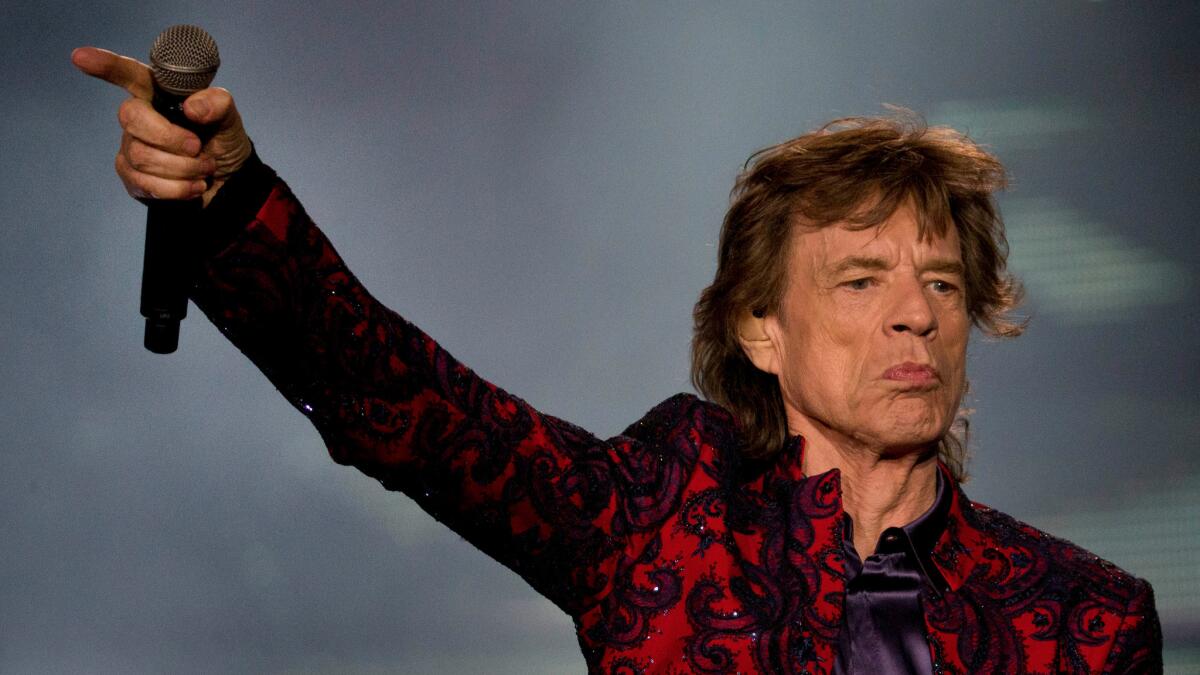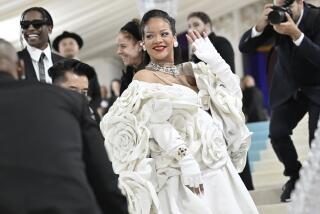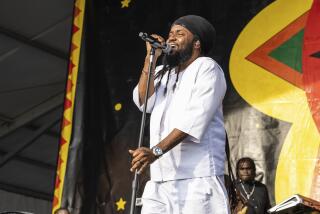Op-Ed: Mick Jagger, modern patriarch

At this moment I can write and a fact checker can confirm the following shocking sentence: Mick Jagger is a great-grandfather. He got there via the old math, best stated in the way of a word problem. If four mothers (Bianca Jagger, Jerry Hall, Luciana Gimenez and Marsha Hunt) bore Mick seven children (including Jade, Georgia May and James) who yielded four grandchildren, including Jade’s daughter, Assisi Jackson, then who is 2-year-old Ezra Key?
Mick’s Jagger’s great-granddaughter.
I never knew any of my own great-grandparents — not one. A great-grandfather is usually so old that he’s dead. A picture on the mantel, a sepia-toned, doubled-breasted-suit-wearing man with coal black eyes and and an elaborate mustache that you just know smells of cigar smoke and wax. He is certainly not Mick Jagger. I mean, here he is, approaching his mid-70s and he’s still shrugging off the darkness ahead and the generations behind, still engaging in his mad rock star dance and getting frankly raunchy with songs like “Start Me Up.”
It’s an image that’s been haunting me with the approach of Father’s Day. Great-grandpa Mick? What to make of that?
I was born in 1968, as the Rolling Stones were hitting their peak — in extravagance, indulgence, drug consumption, transgression and musical expression. Their immortal songs of that era were the soundtrack of childhood, adolescence, youth.
Probably not coincidentally, the golden age of the Stones was also the golden age of divorce. With the adoption of no-fault laws, the U.S. divorce rate doubled between 1967 and 1985. In my junior high school years, every father and every mother were fighting in every kitchen. Every road trip was tense. Every kid was being raised by a single parent. No one could go out on Saturday because it was “my father’s weekend,” which meant an awkward stay with the old man and new girlfriend in an apartment downtown — apartments that always smelled like fresh paint.
To me, Mick Jagger — whose marriage and divorce and marriage and divorce I followed in the gossips as I followed the Cubs on the sports page — personified that greater tide of coupling and uncoupling and begetting and going away. Mick was not my father — he was our father. He stood for all the wayward fathers, all those randy middle-aged men living in a crash pad on Grand Street; for all those who refused to behave like adults or function as parents.
Mick Jagger stands for every baby boomer, the generation that refused to grow up.
For a time, I knew Mick Jagger. I met him when I traveled with the Rolling Stones as a reporter for Rolling Stone magazine in the 1990s — he was a father of five by then — and got to know him better when we collaborated on a screenplay. Even in his 50s he seemed like the oldest man who’d ever lived. So much had already happened to him. He also seemed like the youngest. Far younger than me, and I was in my 30s.
I would meet up with Jagger on tour so we could write on the band’s days off. One night, after dinner, when I went back to the hotel to sleep, Jagger continued on to the Seattle nightclubs, soaking up whatever ambient thrash was moving the partiers around the dance floor. Because the club closed “too early,” he brought all the kids back to his hotel so they could rage on as the sun came up over the Cascades. I always expected the years to mellow him, force him to assume his proper role and age. I was wrong.
Mick Jagger stands for every baby boomer, the generation that refused to grow up, refused to pass on the ancient knowledge that had been transmitted father to son since time out of mind. 1968. 1976. 1981. Somewhere in there the connection was severed, the line went down. They consumed their youth with abandon, then, via their refusal to take on the traditional roles, consumed our childhoods too. They smoked the pot, leaving us the resin. They consumed the 1960s epiphanies, leaving us the rough morning after of the 1970s. They called us Generation X. We were the variable, the unknown — a blank to be figured out later.
Which brings me back to Father’s Day. The holiday was established in Spokane, Wash., in 1910 — a response of sorts to Mother’s Day, but also to a particular set of circumstances. Sonora Smart Dodd kicked off the practice to celebrate her own father, a Civil War veteran whom, following the death of his wife, raised six children — one less than Mick — all by himself. William Jackson Smart became mother and father because he had to, giving his life so his children could thrive. It’s this sacrifice, and how it’s repeated in small ways by millions of fathers, that we honor on Sunday.
Does Mick Jagger, who, as a great-grandfather, will be celebrated by three generations of descendants, deserve William Jackson Smart’s special day? What about all those other boomer dads who took off because they fell out of love? (“Hey man, it happens.”) How do you honor fathers who refused to behave like fathers? Do they merit the gift cards, the neckties and spice racks made in shop class?
Does the old custom suffice, or should we cook up a new kind of holiday for this kind of dad? Maybe an entire weekend in which all generations gather together, drop acid and listen to the Stones’ overlooked masterpiece, “Their Satanic Majesties Request”? It would, at least, be much more fun than unwrapping argyle socks from Bloomingdale’s.
Rich Cohen is the author of “The Sun & The Moon & The Rolling Stones” and co-creator of the HBO series “Vinyl.”
Follow the Opinion section on Twitter @latimesopinion and Facebook
More to Read
A cure for the common opinion
Get thought-provoking perspectives with our weekly newsletter.
You may occasionally receive promotional content from the Los Angeles Times.





